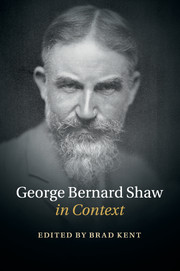Book contents
- Frontmatter
- Dedication
- Contents
- List of illustrations
- Notes on contributors
- Preface
- Acknowledgements
- A Chronology of Shaw's Works
- List of abbreviations
- PART I PEOPLE AND PLACES
- PART II THEATRE
- PART III WRITING AND THE ARTS
- 15 Cinema
- 16 Journalism
- 17 Letters
- 18 Media and technology
- 19 Modernism
- 20 Music
- 21 Novels
- 22 Publishers and publishing
- 23 Visual arts
- PART IV POLITICS
- PART V CULTURE AND SOCIETY
- PART VI RECEPTION AND AFTERLIFE
- Further reading
- Index
- References
16 - Journalism
from PART III - WRITING AND THE ARTS
Published online by Cambridge University Press: 05 October 2015
- Frontmatter
- Dedication
- Contents
- List of illustrations
- Notes on contributors
- Preface
- Acknowledgements
- A Chronology of Shaw's Works
- List of abbreviations
- PART I PEOPLE AND PLACES
- PART II THEATRE
- PART III WRITING AND THE ARTS
- 15 Cinema
- 16 Journalism
- 17 Letters
- 18 Media and technology
- 19 Modernism
- 20 Music
- 21 Novels
- 22 Publishers and publishing
- 23 Visual arts
- PART IV POLITICS
- PART V CULTURE AND SOCIETY
- PART VI RECEPTION AND AFTERLIFE
- Further reading
- Index
- References
Summary
Bernard Shaw's writing career began with a struggle to establish and support himself as a journalist, and these early decades of labour for the press endowed him with the most characteristic elements of what would become his literary voice. The drive to make a point, to argue and persuade, to instruct and entertain at once, to highlight authorial persona even in an ostensibly objective form – all of these aspects of Shaw's literary style can be conceptualised in terms of his formative years writing for the press in the era of New Journalism. The ‘New Journalism’ – a term famously used by Matthew Arnold in 1887 to refer to a vulgar new mode understood to have come from American periodicals – was, as Shaw's contemporary Evelyn March Phillipps put it, more ‘personal and confidential in tone’ than traditional journalism, characterised by ‘that easy personal style, that trick of bright colloquial language’, and ‘that determination to arrest, amuse, or startle’. Such a description could easily refer to Shaw's signature style in literature as well as journalism, suggesting the extent to which Shaw's literary voice emerged from a wider context of late-nineteenth-century journalism.
W. T. Stead, editor of the Pall Mall Gazette for which Shaw wrote book reviews from 1885 to 1888, was a preeminent advocate of the New Journalism, and he proclaimed in 1886: ‘Impersonal journalism is effete. To influence men you must be a man, not a mock-uttering oracle … For the proper development of a newspaper the personal element is indispensable’. The ‘personal element’ – or at least the effect of the personal element – was Shaw's journalistic métier. In an 1895 review of Arthur Pinero's The Notorious Mrs Ebbsmith for the Saturday Review, for example, Shaw wrote: ‘And here let me warn the reader to carefully discount my opinion in view of the fact that I write plays myself, and that my school is in violent reaction against that of Mr Pinero. But my criticism has not, I hope, any other fault than the inevitable one of extreme unfairness’.
- Type
- Chapter
- Information
- George Bernard Shaw in Context , pp. 127 - 134Publisher: Cambridge University PressPrint publication year: 2015
References
- 2
- Cited by

